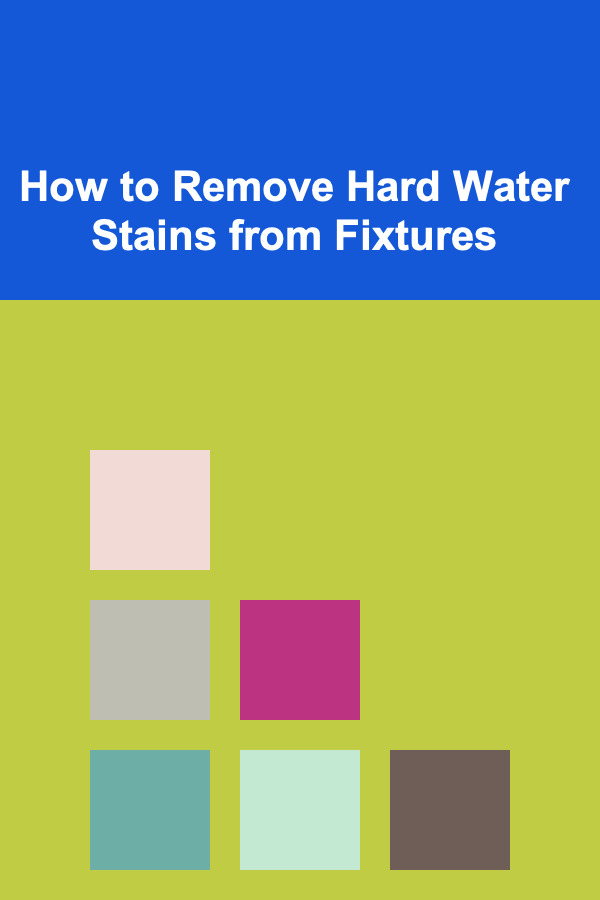
How to Remove Hard Water Stains from Fixtures
ebook include PDF & Audio bundle (Micro Guide)
$12.99$11.99
Limited Time Offer! Order within the next:

Hard water stains are a common household nuisance that can mar the beauty of your fixtures and surfaces. These unsightly deposits form when hard water---water with high mineral content, primarily calcium and magnesium---evaporates and leaves behind residue. Over time, these stains can build up, leading to an unattractive appearance and potentially damaging your fixtures if not addressed promptly.
This comprehensive guide will explore various methods for removing hard water stains from fixtures, including prevention strategies, cleaning techniques, and tips for maintaining your fixtures to keep them sparkling clean.
Understanding Hard Water Stains
1. What Causes Hard Water Stains?
When hard water evaporates, it leaves behind mineral deposits on faucets, showerheads, sinks, toilets, and other fixtures. The main culprits are:
- Calcium Carbonate: This compound forms when carbon dioxide reacts with hard water minerals.
- Magnesium Hydroxide: Another common mineral that contributes to staining and scaling.
- Silica: Often present in hard water, silica can also create a cloudy appearance on glass and metal surfaces.
These minerals stick to surfaces over time, creating a whitish or cloudy buildup that is difficult to remove.
2. Identifying Hard Water Stains
Hard water stains may appear as:
- White Spots: These are usually easy to spot, particularly on darker surfaces or glass.
- Cloudiness: Glass shower doors often accumulate a hazy film due to hard water deposits.
- Rings: Taps and faucets may develop rings around the base where water frequently runs.
Understanding the characteristics of hard water stains can help you devise effective cleaning methods.
Tools and Materials Needed
Before diving into the cleaning process, gather the necessary tools and materials. Here's a list of items you may need:
-
Cleaning Solutions:
- White vinegar
- Baking soda
- Lemon juice
- Commercial descalers (such as CLR or Lime-A-Way)
-
Cleaning Tools:
- Soft cloths or microfiber towels
- Non-abrasive sponge
- Old toothbrush or soft-bristle brush
- Spray bottle
- Bucket
-
Protective Gear:
- Rubber gloves (to protect your hands)
- Safety goggles (if using strong chemicals)
Methods for Removing Hard Water Stains
1. Vinegar and Baking Soda Method
Vinegar is a powerful natural cleaner, and when combined with baking soda, it becomes an effective remedy for hard water stains.
Steps:
-
Prepare the Solution:
- Mix equal parts of white vinegar and water in a spray bottle.
- For tougher stains, sprinkle baking soda directly onto the stained area before applying vinegar.
-
Apply the Solution:
- Spray the vinegar solution generously onto the stained fixture.
- If you used baking soda, apply vinegar immediately after sprinkling it on the stain. You will observe fizzing, which helps lift the stains.
-
Let It Sit:
- Allow the mixture to sit for about 10-15 minutes to penetrate the stains.
-
Scrub Gently:
- Use a non-abrasive sponge or soft cloth to scrub the area gently.
- For crevices or hard-to-reach spots, an old toothbrush works well.
-
Rinse Thoroughly:
- Rinse the area with warm water to remove any remaining vinegar and baking soda residue.
- Wipe dry with a clean cloth to prevent new stains from forming.
2. Lemon Juice Method
Lemon juice contains citric acid, which effectively dissolves hard water deposits.
Steps:
-
Extract Fresh Lemon Juice:
- Squeeze fresh lemon juice into a bowl or directly onto the stained areas.
-
Apply the Juice:
- Use a sponge or cloth to rub the lemon juice onto the stains.
- For tough stains, you can cut a lemon in half and use it as a scrubbing tool.
-
Let It Sit:
- Allow the lemon juice to sit on the stains for 10-15 minutes.
-
Scrub and Rinse:
- Scrub the area gently with a non-abrasive sponge.
- Rinse thoroughly with water and wipe dry.
3. Commercial Descalers
For stubborn hard water stains, commercial descaling products can be highly effective. Brands like CLR, Lime-A-Way, or Zep offer specialized solutions designed to tackle mineral buildup.
Steps:
-
Read Instructions:
- Carefully read the manufacturer's instructions on the label before use.
-
Apply the Product:
- Apply the descaler directly onto the stained area using a cloth or sponge.
- Ensure even coverage by following the instructions regarding application.
-
Let It Sit:
- Allow the product to sit for the recommended duration, usually around 3-10 minutes.
-
Scrub and Rinse:
- Use a non-abrasive sponge to scrub the surface.
- Rinse thoroughly with water to remove any chemical residue.
-
Safety Precautions:
- Always wear gloves and goggles when using commercial cleaners to protect your skin and eyes from harsh chemicals.
4. Baking Soda Paste
Baking soda alone can also serve as an effective cleaning agent.
Steps:
-
Make a Paste:
- Combine baking soda with a small amount of water to form a thick paste.
-
Apply the Paste:
- Spread the paste over the stained areas using a cloth or sponge.
-
Let It Sit:
- Allow the paste to sit for 15-30 minutes, depending on the severity of the stains.
-
Scrub and Rinse:
- Scrub the area gently with a non-abrasive sponge or cloth.
- Rinse thoroughly with water and dry with a clean cloth.
5. Toothpaste Method
Surprisingly, toothpaste can work wonders on hard water stains due to its mild abrasives.
Steps:
-
Choose Non-Gel Toothpaste:
- Select a regular, non-gel toothpaste for this method.
-
Apply Toothpaste:
- Dab a small amount of toothpaste onto the stained area.
-
Scrub Gently:
- Use a soft cloth or an old toothbrush to scrub the area in circular motions.
-
Rinse and Dry:
- Rinse thoroughly with water and wipe dry.
Preventing Future Hard Water Stains
To minimize the occurrence of hard water stains, implementing preventive measures is key. Here are some strategies to consider:
1. Install a Water Softener
One of the most effective long-term solutions is installing a water softener in your home. These systems reduce the hardness of water by removing calcium and magnesium ions, leading to fewer mineral deposits in fixtures and appliances.
2. Regular Cleaning Routine
Incorporating regular cleaning into your routine can help prevent the buildup of hard water stains. Aim to clean fixtures at least once a month using the methods discussed above.
3. Wipe Down Fixtures After Use
Develop the habit of wiping down fixtures, especially in the bathroom and kitchen, with a dry cloth after each use. This simple action helps remove excess moisture and minimizes mineral deposit formation.
4. Use Vinegar in Your Cleaning Routine
Incorporate white vinegar into your regular cleaning supplies. Periodically spraying diluted vinegar on your fixtures can inhibit mineral buildup and keep surfaces sparkling.
5. Avoid Mineral-Rich Soaps
Choose soaps and detergents labeled as low in minerals. This helps reduce the chances of soap scum and hard water deposits forming on your fixtures.
6. Seal Surfaces
Applying a sealant to certain surfaces, such as granite or marble, can create a protective barrier that prevents mineral deposits from adhering.
Maintaining Your Fixtures for Longevity
Proper maintenance of your fixtures not only keeps them looking good but also prolongs their lifespan. Here are additional tips to maintain your fixtures effectively:
1. Use Gentle Cleaners
Avoid abrasive cleaners that can scratch or damage finishes. Opt for gentle, non-toxic cleaning agents that are safe for your specific fixtures.
2. Inspect Regularly
Regularly inspect your fixtures for signs of hard water stains, leaks, or corrosion. Addressing issues early can prevent more extensive damage.
3. Protect Finishes
Consider using wax or protective coatings designed for your specific fixtures, such as chrome or stainless steel. These products can provide a barrier against water spots and stains.
4. Be Mindful of Temperature
Hot water can accelerate mineral deposition. When cleaning, using lukewarm or cool water may help mitigate this issue.
5. Seek Professional Help
If hard water stains persist despite your efforts, consider hiring a professional cleaning service. Experts have access to specialized tools and techniques that can remove stubborn stains without damaging your fixtures.
Conclusion
Removing hard water stains from fixtures requires a combination of effective cleaning methods, preventive strategies, and proper maintenance. By understanding the causes and characteristics of hard water stains, you can take proactive steps to eliminate them and preserve the beauty of your fixtures.
Implementing regular cleaning habits and utilizing natural remedies or commercial products will go a long way in keeping your home looking pristine. With diligence and the right approach, you can ensure that hard water stains become a thing of the past, enhancing both the aesthetic appeal and longevity of your fixtures. Embrace these practices, and enjoy a clean, sparkling home free from the burden of hard water stains!
Reading More From Our Other Websites
- [Home Security 101] How to Safely Disable Unused Smart Home Features to Enhance Security
- [Gardening 101] Top 10 Low‑Maintenance Perennials for a Stunning Garden All Seasons Long
- [Organization Tip 101] How to Choose the Right Dryer Vent Cleaning Kit for Your Needs
- [Home Renovating 101] How to Find Affordable Materials for Your Next DIY Home Projects
- [Hiking with Kids Tip 101] Nature Walks for All Ages: Must‑Try Day Hikes for Family Fun
- [Survival Kit 101] The Best Compact Survival Kit for Urban Apartment Dwellers Facing Power Outages
- [Home Family Activity 101] How to Organize a Family Baking Day with Creative Recipes
- [Home Holiday Decoration 101] How to Transform Your Front Porch into a Holiday Entrance
- [Home Storage Solution 101] How to Declutter and Organize Cleaning Supplies in a Small Space
- [Personal Care Tips 101] How to Choose Lip Balm to Match Your Skin Tone and Needs

How to Create a Cozy Atmosphere with Holiday Lighting
Read More
How to Embrace Change and Impermanence with Stoicism
Read More
How to Tidy Your Home Quickly When Unexpected Guests Arrive
Read More
How To Understand Relational Databases vs. NoSQL
Read More
How to Create a Custom Quilt Label
Read More
How to Integrate CRM with Marketing Automation Platforms
Read MoreOther Products

How to Create a Cozy Atmosphere with Holiday Lighting
Read More
How to Embrace Change and Impermanence with Stoicism
Read More
How to Tidy Your Home Quickly When Unexpected Guests Arrive
Read More
How To Understand Relational Databases vs. NoSQL
Read More
How to Create a Custom Quilt Label
Read More